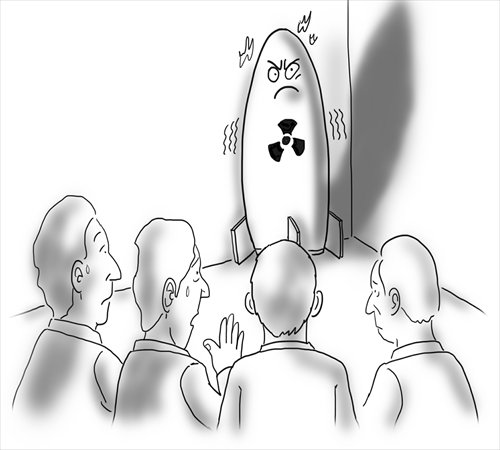Effective enforcement decides sanctions result

Illustration: Liu Rui/GT
Tensions are rising in Northeast Asia in the wake of North Korea's provocations, including the fourth nuclear test and satellite launch. After the nuclear test in January and satellite launch in February 2016, the UN Security Council unanimously adopted Resolution 2270 that imposes and strengthens sanctions on North Korea on March 2.
The resolution requires member states to inspect all cargo traveling to or from North Korea, or on a vessel brokered by North Korea, by air, land, or sea. The resolution prohibits member states from selling or supplying aviation fuel to North Korea so that it cannot be diverted to its ballistic missile program.
It also requires that member states repatriate North Koreans or other foreign nationals found to be working on behalf of certain entities connected to the missile program, as designated by the Security Council.
Previous resolutions adopted by the UN Security Council since 2006 have been largely ineffective in preventing North Korea from advancing its nuclear weapons and ballistic missile programs.
The effectiveness of the sanctions, to a large extent, depends upon China. The effects of this have yet to be seen. Although China has repeatedly emphasized it would vigorously implement the sanctions, it is not clear, to outside observers, whether China will uphold them stringently. There are many loopholes in the implementation process of the sanctions.
If China does not prevent smuggling, the newly stepped up sanctions are not likely to do real harm to the North Korean regime. In the Dandong area, for example, it is said that the fewer legal shipments travel from China to North Korea due to sanctions, the more illegal smuggling of goods through the border there is.
If the sanctions are not effective, the result would be a disaster. Pyongyang will continue to provoke the world until it completes the deployment of nuclear weapons.
As long as North Korea continues to develop nuclear weapons, more US strategic assets could be deployed. THAAD can be deployed. South Korea-US joint military drills could be strengthened.
However, these measures are all defensive and could be postponed or cancelled, depending on North Korea's actions. If North Korea shows signs of giving up its nuclear weapons program and does not threaten the South with conventional weapons or weapons of mass destruction, including chemical weapons, tensions will be reduced and stability will be maintained on the Korean peninsula.
Given North Korea's test firing of short range missile and artillery, North Korea is not likely to give up nuclear weapons and come to negotiation table at this point of time. It seems as though North Korea's position will not change and would not give up nuclear weapons in the near future, regardless of the sanctions.
It looks like North Korean regime is determined to complete deployment of nuclear weapons.
What if North Korea conducts another nuclear test? What if it conducts a military provocation again, such as the Yeonpyeong island bombardment in 2010?
China, together with the international community, should show its resolve not to tolerate North Korea to develop nuclear weapons. As Chinese Foreign Minister Wang Yi mentioned in a press interview during the two sessions on March 8th, sanctions are not the goal but an instrument. Wang emphasized that "The sanctions are a necessary measure, ensuring stability is an urgent matter, and negotiation is the fundamental path."
There is no reason to disagree on this principle. What is more important is how to achieve the goal of denuclearization. No more negotiations for the sake of negotiation, no more dialogue for the sake of dialogue. This could be North Korea's strategy for buying time to complete the deployment of nuclear weapons.
It is also necessary for the international community to put more pressure by implementing sanctions on North Korea effectively and at the same time to show a way out by sending a clear message to North Korea with one voice. China needs to play a constructive role in the process. The five parties other than North Korea involved in the Six-Party Talks need to map out a plan to make North Korea's perception on the international situation change and North Korea come to the negotiation table for denuclearization.
Military provocation by North Korea, if any, must be deterred and retaliated by military means. South Korea and China should build trust at every level by expanding and deepening the dialogue and communication channels between the two. The two need to cooperate in order to manage the security situation and the dangers of a potential crisis on the Korean Peninsula.
The author is director of the Center for China Studies, Sejong Institute. opinion@globaltimes.com.cn Follow us on Twitter @GTopinion